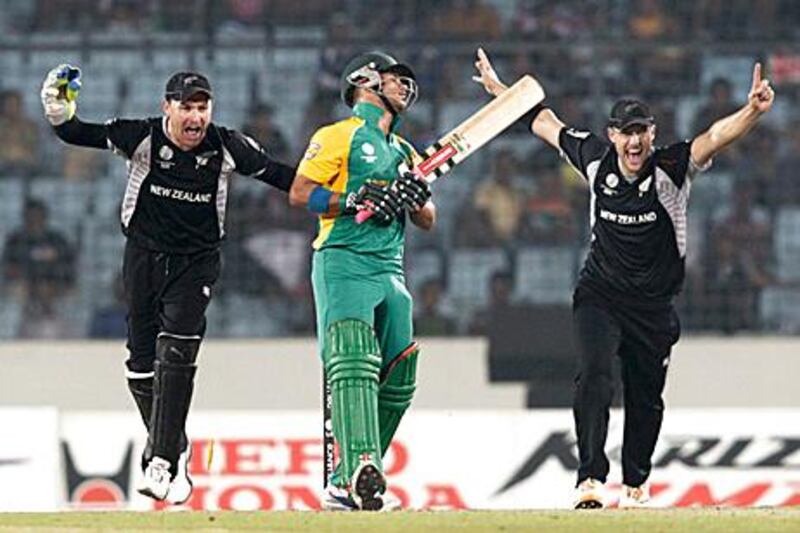MIRPUR // The more things change, the more the past returns to haunt South Africa.
Having fallen each time they have confronted a knock-out hurdle at the World Cup, they did so again in Mirpur, losing eight wickets for 64 runs in 19.1 overs against a New Zealand side that applied boa-constrictor-like pressure in the field.
Despite a well-balanced squad and enviable talent, the Proteas again head home early, where plans for 2015 will not involve Graeme Smith, who has relinquished charge of the one-day side.
He looked shattered at the end of it all, but when a reporter put it to him that perhaps South Africa could blame destiny for their cruel World Cup fate, he disagreed.
"That's maybe hiding from reality," he said. "We've got to take responsibility as a team. If we're honest, we just weren't good enough."
They had started brilliantly, reducing New Zealand to 16 for two. But Jesse Ryder and Ross Taylor reined in naturally aggressive games to add 114, by far the highest partnership of the match.
Ryder, who gauged the pace of the pitch beautifully, went on to make 83, and a late cameo from Kane Williamson pushed the total beyond 200.
It should still not have been enough. The early loss of Hashim Amla, bizarrely caught at slip via the keeper's boot, did not help, but South Africa were handily placed at 108 for two when Jacques Kallis decided to take on a short ball from Tim Southee.
"The beauty of it was that it didn't stay in the air that long," said Jacob Oram. "My only thought was to just run. Thankfully, I'm 6ft 6ins."
That triggered a collapse that Smith was at a loss to explain. "The ball had gone a bit soft, but we needed to show more composure," he said. "Instead, we lost four quick wickets and that set us right back."
It also exposed a middle order that had surrendered a game to England earlier in the tournament, one that New Zealand had identified as a possible weakness. "It was all about getting past AB de Villiers," said Daniel Vettori. "[Johan] Botha at No 7 meant they had a longish tail."
The 23,000-strong crowd lapped it up, applauding both sides as the game wound towards what has become a painfully predictable conclusion for a generation of South African fans.
"My catch broke up a partnership that was starting to build," said Oram, when asked about the turning points. "But [Martin] Guptill running out De Villiers made us grow a foot taller. We could sense them getting worried."
Apart from De Villiers, who batted fluently for 35, the only resistance came from Faf du Plessis, who scrapped furiously for a 43-ball 36 before finding cover with a flashing drive.
"They kept attacking," said a disconsolate Smith. "There's nothing I can say that will make the fans feel better. We feel terrible. But I can't fault the way we've trained or prepared for this. We've just got to take it on the chin.
"Hopefully in the future, it will be nice if South Africa won the World Cup."





